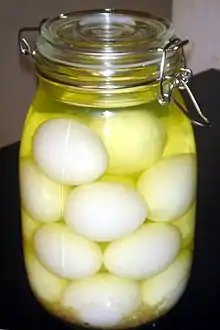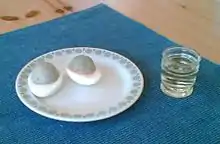Pickled egg
Pickled eggs are typically hard boiled eggs that are cured in vinegar or brine. As with many foods, this was originally a way to preserve the food so that it could be eaten months later. Pickled eggs have since become a favourite among many as a snack or hors d'œuvre popular in pubs, bars and taverns, and around the world in places where beer is served.
 | |
| Course | hors d'œuvre |
|---|---|
| Main ingredients | hard boiled egg, cured in vinegar or brine |
| Nutritional value per 1 egg | |
|---|---|
| Energy | 334 kJ (80 kcal) |
5.5 g | |
| Saturated | 2 g |
7.5 g | |
| Minerals | Quantity %DV† |
| Sodium | 4% 56 mg |
| Other constituents | Quantity |
| Cholesterol | 210 mg |
| |
| †Percentages are roughly approximated using US recommendations for adults. Source: Calorie King | |

After the eggs are hard boiled, the shell is removed and they are submerged in a solution of vinegar, salt, spices, and other seasonings. Recipes vary from the traditional brine solution for pickles, to other solutions, which can impart a sweet or spicy taste.
The final taste is largely determined by the pickling solution. The eggs are left in this solution from one day to several months. Prolonged exposure to the pickling solution may result in a rubbery texture. A common practice is to puncture the egg with a toothpick to allow the pickling solution to penetrate to the egg's interior, but this is dangerous as it can introduce clostridium into the finished product.[1] Eggs prepared with this method have sometimes had high enough levels of botulinum toxin to cause illness in a human.
Pickled eggs may be served as part of a main course, hors d'œuvres, or garnishes.[2]
Recipes
A variant historically associated with the Pennsylvania Dutch is the pickled beet egg where whole beets, onions, vinegar, sugar, salt, cloves, and (optionally) a cinnamon stick are used as the brine.[3] The eggs take on a pink or even purple colour from the beets and have a sweet and sour taste. Pickled red-beet eggs, long a common food at picnics and pot-lucks in the Pennsylvania Dutch country, have diffused into the folk cuisine of the surrounding "English" and become a popular snack that can be bought in supermarkets as far east as the Delaware River.
A typical British recipe for pickled eggs includes eggs, vinegar, salt and sugar. The eggs are then boiled, peeled, then boiled with the other ingredients. They last for three to four months (for best quality)[4] and are traditionally found in British public houses[5] and fish and chip shops.
See also
- Century egg – A Chinese egg product made by preserving eggs in a mixture of clay, ash, salt, quicklime, and rice hulls
- Food preservation – Inhibition of microbial growth in food
- Food safety
- Iron egg – Egg-based dish from Taiwan
- Tea egg – Chinese savory food commonly sold as a snack
References
- "Foodborne Botulism From Eating Home-Pickled Eggs --- Illinois, 1997". Cdc.gov. Retrieved 5 December 2019.
- "Washington State University EB1104" (PDF). Cru.cahe.wsu.edu. Archived from the original (PDF) on 2 September 2006. Retrieved 5 December 2019.
- "Pickled Red Beet Eggs Recipe by Jann". Cookeatshare.com. Retrieved 5 December 2019.
- "National Center for Home Food Preservation | How Do I? Pickle". Nchfp.uga.edu. Retrieved 2016-06-18.
- Tom Cutler, 211 Things a Bright Boy Can Do, ISBN 978-0007778430
